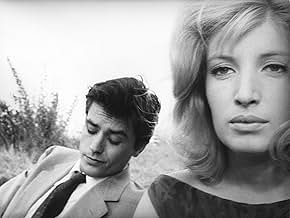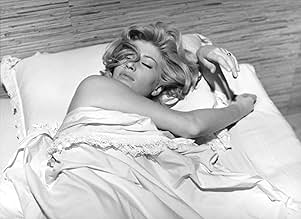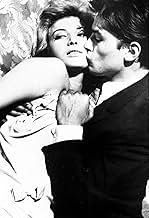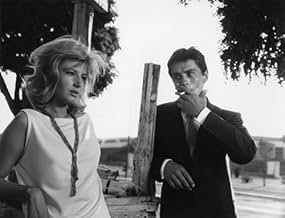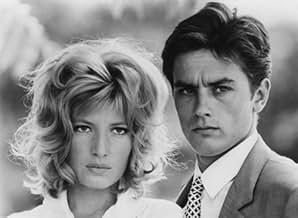IMDb RATING
7.7/10
24K
YOUR RATING
A young woman meets a vital young man, but their love affair is doomed because of the man's materialistic nature.A young woman meets a vital young man, but their love affair is doomed because of the man's materialistic nature.A young woman meets a vital young man, but their love affair is doomed because of the man's materialistic nature.
- Awards
- 1 win & 5 nominations total
Cyrus Elias
- Intoxicated Man
- (uncredited)
Alba Maiolini
- Woman at the Stock Market
- (uncredited)
Featured reviews
While The Eclipse is one of the most superbly directed films I may have ever seen, on a first impression it was (obviously) a lot to take in all at once. As with his other films, L'Eclisse isn't for everyone. But Antonioni distinguishes himself here as a great artist of the medium by not only creating the kinds of compositions (lensed by Gianni De Venanzo, who worked with Antonioni on Il Grido and La Notte as well as the WW2 documentary Days of Glory and Fellini's 8 1/2) no one could ever justifiably imitate correctly, but creating a depth to the substance. On one hand one aspect of L'Eclisse that's appealing is how it balances out the style and substance (though the style is arguably the more distinguishable and greater than the two). On the other another aspect is that it could put off viewers not terribly familiar with Antonioni's psychology (which, like Scorsese for example, is at least consistent and engaging with the rest of the director's catalog of work). How intently he gets inside Vittoria's head, and at the same time maintains a detachment despite the varying emotional contexts, is extraordinary, if highly personal.
Like Vittoria, Antonioni does something that's fascinating throughout the film - though one doesn't know what it is exactly that holds Vittoria, and for that matter Piero, in their respective attitudes, one doesn't feel quite left out of anything heart-stopping for the story/character's sake. The film lets us in just enough as to no keep us curious, and it also doesn't keep itself in a depressive tone, as it is realistic to how the people in this city exist. In fact, there's another facet to L'Eclisse which especially worked for me - the poetry that slips itself in small doses amid the visual sweep. Whether it be one of the long takes, an elongated view on a building or street-light, or on Vitty as Vittoria, it's in the observation that subtext forms. This is the kind of motion picture that a shot-by-shot analysis would serve like would a Picasso or Chagal.
And as a plus to the film's success are the actors turns - Monica Vitti is the only actress from that period and country I can think of who could've pulled off what Antonioni wanted in Vittoria. Her face, after being in front of us minute after minute, becomes familiar despite her inner-angst. She knows what Vittoria's fears and loss of vitality means for the story. She's not a person without a laugh or smile ever, yet those emotions arrive only after the known mood is peeled away like a layer of skin. "To love I think one shouldn't know the other," she says, almost arbitrarily. "But then, maybe one shouldn't love at all." Is this Antonioni hitting the hammer on the head, or is it just one of those kinds of comments a woman like her would make? As in L'Avventura, there is the mystery around the female lead. Is love beyond her reach we might wonder, or has the idea of it vanished under false pretense? Alain Deleon also deserves credit for his Piero, as he counters her quiet, more fogged demeanor as a stockbroker in Rome. That under current to the story - the major bustle and noise of the gamblers in the stockbroker's hall - is also part of the contrast, to the stretches with minimal dialog and sound.
The last act, which regards Vittoria's relationship to Piero (a time after he empty break-up with her past lover Rodrigo) culminates in an astonishing feat of storytelling and film-art. As it becomes all the more evident neither one will arrive at a certain (usually) desolate cross-road corner to meet up, the idea of an eclipse over these people and places is hypnotic, unique. For its time it must've been quite a stroke by a director, and forty or so years later the whole sequence leaves its effect in due. Haunting formations beneath and surrounded by the sky and clouds, and it's a bit intellectually loaded. There can be any interpretation for this climax (or as one could claim an anti-climax) that isn't manipulated by Antonioni. The sequence, as with the rest of the film, asks only to see the world based on how one would think it can, or will, be seen. And it fits memorably, like bedroom slippers, into the prime of Antonioni's career as an auteur.
Among the three films in Antonioni's films from this period of his career (1960-1962), this is the one I'd recommend the highest. The Eclipse is also the kind that's nearly mandatory to see more than once if sincerely interested in checking out at all (in other words, don't watch it with pre-conceived notions of this being a dramatic love story with solid conventions to it).
Like Vittoria, Antonioni does something that's fascinating throughout the film - though one doesn't know what it is exactly that holds Vittoria, and for that matter Piero, in their respective attitudes, one doesn't feel quite left out of anything heart-stopping for the story/character's sake. The film lets us in just enough as to no keep us curious, and it also doesn't keep itself in a depressive tone, as it is realistic to how the people in this city exist. In fact, there's another facet to L'Eclisse which especially worked for me - the poetry that slips itself in small doses amid the visual sweep. Whether it be one of the long takes, an elongated view on a building or street-light, or on Vitty as Vittoria, it's in the observation that subtext forms. This is the kind of motion picture that a shot-by-shot analysis would serve like would a Picasso or Chagal.
And as a plus to the film's success are the actors turns - Monica Vitti is the only actress from that period and country I can think of who could've pulled off what Antonioni wanted in Vittoria. Her face, after being in front of us minute after minute, becomes familiar despite her inner-angst. She knows what Vittoria's fears and loss of vitality means for the story. She's not a person without a laugh or smile ever, yet those emotions arrive only after the known mood is peeled away like a layer of skin. "To love I think one shouldn't know the other," she says, almost arbitrarily. "But then, maybe one shouldn't love at all." Is this Antonioni hitting the hammer on the head, or is it just one of those kinds of comments a woman like her would make? As in L'Avventura, there is the mystery around the female lead. Is love beyond her reach we might wonder, or has the idea of it vanished under false pretense? Alain Deleon also deserves credit for his Piero, as he counters her quiet, more fogged demeanor as a stockbroker in Rome. That under current to the story - the major bustle and noise of the gamblers in the stockbroker's hall - is also part of the contrast, to the stretches with minimal dialog and sound.
The last act, which regards Vittoria's relationship to Piero (a time after he empty break-up with her past lover Rodrigo) culminates in an astonishing feat of storytelling and film-art. As it becomes all the more evident neither one will arrive at a certain (usually) desolate cross-road corner to meet up, the idea of an eclipse over these people and places is hypnotic, unique. For its time it must've been quite a stroke by a director, and forty or so years later the whole sequence leaves its effect in due. Haunting formations beneath and surrounded by the sky and clouds, and it's a bit intellectually loaded. There can be any interpretation for this climax (or as one could claim an anti-climax) that isn't manipulated by Antonioni. The sequence, as with the rest of the film, asks only to see the world based on how one would think it can, or will, be seen. And it fits memorably, like bedroom slippers, into the prime of Antonioni's career as an auteur.
Among the three films in Antonioni's films from this period of his career (1960-1962), this is the one I'd recommend the highest. The Eclipse is also the kind that's nearly mandatory to see more than once if sincerely interested in checking out at all (in other words, don't watch it with pre-conceived notions of this being a dramatic love story with solid conventions to it).
Pros:
1. The scope of the film is very impressive, particularly in regards to the plethora of extras and different locations used.
2. The usage of prolonged silences and wide shots really helps to ram home the adverse effects of the break-up with Riccardo (Francisco Rabal), and the feelings that naturally accompany a break-up.
3. Both Alain Delon (Piero) and Monica Vitti (Vittoria) give incredible performances.
4. The cinematography is absolutely beautiful, especially when the camera pulls back and allows you to take in the scenery completely.
5. The comedy, though infrequent, is hilarious and stems from genuinely grounded character interactions.
6. Monica Vitti and Alain Delon harbour electric chemistry with each other, and it really shines through during the intimately romantic scenes.
Cons: 1. The movie is ridiculously slow-paced. Even though the reason for its slow-pace is clear, it still feels unnecessarily slow. 2. The stock market story-line is exceedingly uninteresting, and far too much screen-time is dedicated towards it. 3. None of the characters engaging which makes it difficult to care. This is unfortunate as the run-time is over 2 hours long. 4. The last 5-10 minutes drag on needlessly.
Cons: 1. The movie is ridiculously slow-paced. Even though the reason for its slow-pace is clear, it still feels unnecessarily slow. 2. The stock market story-line is exceedingly uninteresting, and far too much screen-time is dedicated towards it. 3. None of the characters engaging which makes it difficult to care. This is unfortunate as the run-time is over 2 hours long. 4. The last 5-10 minutes drag on needlessly.
The Eclipse denotes Michelangelo Antonioni 's flawless taste,and his powerful,virile instinct for strong compositions;this elegant and suave movie is one of the cinema's best pieces of poetry (I must also confess that I prefer this early,younger,"black and white" and peninsular Michelangelo Antonioni;he was 50 years when he made L'ECLISSE).Before he approached the '60s counterculture,Antonioni made a few strong movies not only for the intellectuals but also about intellectuals.
This one is an incredibly rich movie,a movie about many things:about solitude,financial pawns,a woman's indefinite aspirations,the vibrating city beauty,and the heart's resilience,the woman soul's density,the urban aesthetic;and also about:greed,people that search gropingly .Little wheels in the gearing of the stock exchange;the stock exchange's crushing machine.Antonioni is caustic and sober.His theme,the human monad,is inexhaustible.The naturalness,the charm,the intensity,the integrity,the width of this film must be mentioned.Antonioni proved that,for his cinema,experiments are always ways and means,while the most intense poetry is the aim.(Each great director is an experimenter;all great directors are experimenters,only to be better poets.)
Antonioni is one of the three directors who,according to Averty,never made a bad movie (and Antonioni's creation was,for almost two decades, quite abundant;it is only after Blowup (1966) that he went slow,making some seven movies in so many decades).His movies don't have a "sockdolager",that's part of what makes them so good and endearing.Experimenting in countless ways,Antonioni never forgot to be a poet,and never failed.His aesthetic aim has a side of ingenuity and directness that enchants in an unfailing way.
And what is Antonioni's poetry?It is this compact texture,this density of the people and of the life,the striking immediacy.It is amazing also how Antonioni put all of himself in this beautiful movie,The Eclipse.
Like a few others,The Eclipse is one of the movies that give us the taste of what cinema can be.
This one is an incredibly rich movie,a movie about many things:about solitude,financial pawns,a woman's indefinite aspirations,the vibrating city beauty,and the heart's resilience,the woman soul's density,the urban aesthetic;and also about:greed,people that search gropingly .Little wheels in the gearing of the stock exchange;the stock exchange's crushing machine.Antonioni is caustic and sober.His theme,the human monad,is inexhaustible.The naturalness,the charm,the intensity,the integrity,the width of this film must be mentioned.Antonioni proved that,for his cinema,experiments are always ways and means,while the most intense poetry is the aim.(Each great director is an experimenter;all great directors are experimenters,only to be better poets.)
Antonioni is one of the three directors who,according to Averty,never made a bad movie (and Antonioni's creation was,for almost two decades, quite abundant;it is only after Blowup (1966) that he went slow,making some seven movies in so many decades).His movies don't have a "sockdolager",that's part of what makes them so good and endearing.Experimenting in countless ways,Antonioni never forgot to be a poet,and never failed.His aesthetic aim has a side of ingenuity and directness that enchants in an unfailing way.
And what is Antonioni's poetry?It is this compact texture,this density of the people and of the life,the striking immediacy.It is amazing also how Antonioni put all of himself in this beautiful movie,The Eclipse.
Like a few others,The Eclipse is one of the movies that give us the taste of what cinema can be.
In the suburb of Rome, the translator Vittoria (Monica Vitti) breaks her engagement with her boyfriend, the writer Ricardo (Francisco Rabal), after a troubled night. Vittoria goes to downtown to meet her mother (Lilla Brignone), who is addicted in Stock Market, and she meets the broker Piero (Alain Delon) in a day of crash in the Stock Market. The materialist Piero and the absent Vittoria begins a monosyllabic relationship.
"L'Eclisse" is a love story in the world of Michelangelo Antoniani, where the lack of communication, emptiness and loneliness in the big city prevails over the human feelings. The first ten or fifteen minutes with Vittoria and Riccardo alone in his apartment, practically without any words (actually very few words are spoken), is amazing, showing a couple whose love and relationship is completely exhausted. The scenes in the Stock Market of Rome are also very impressive. Monica Vitti, the favorite actress of Antonioni, shows a stunning beauty and her alienation of feelings is expressed by her face and few words along the story. My vote is seven.
Title (Brazil): "O Eclipse" ("The Eclipse")
"L'Eclisse" is a love story in the world of Michelangelo Antoniani, where the lack of communication, emptiness and loneliness in the big city prevails over the human feelings. The first ten or fifteen minutes with Vittoria and Riccardo alone in his apartment, practically without any words (actually very few words are spoken), is amazing, showing a couple whose love and relationship is completely exhausted. The scenes in the Stock Market of Rome are also very impressive. Monica Vitti, the favorite actress of Antonioni, shows a stunning beauty and her alienation of feelings is expressed by her face and few words along the story. My vote is seven.
Title (Brazil): "O Eclipse" ("The Eclipse")
Antonioni's 'L'Eclisse' depicts the emptiness and and meaningless of life in the post-Second World War world under the shadow of the nuclear threat. This is represented by the mushroom shaped water-tower looming outside the window in the film's early sequences, and is referred to again in newspaper headlines towards the end of the film. This film was made in 1962, a year after the Berlin crisis, and in the year of the Cuba crisis when we came very close to nuclear war between the USA and the USSR.
The film also depicts the greed of capitalism, as shown in the mad, chaotic scenes in the Rome Stock Exchange and the obsessive gambling of the mother character.
The location, with distant shots of Benito Mussolini's EUR buildings on the outskirts of Rome, also suggest a meaningless, empty, soulless Brave New World all overshadowed by the nuclear threat, where people suffer loneliness and depression and feel unable to make long-term commitments.
The film also depicts the greed of capitalism, as shown in the mad, chaotic scenes in the Rome Stock Exchange and the obsessive gambling of the mother character.
The location, with distant shots of Benito Mussolini's EUR buildings on the outskirts of Rome, also suggest a meaningless, empty, soulless Brave New World all overshadowed by the nuclear threat, where people suffer loneliness and depression and feel unable to make long-term commitments.
Alain Delon's Top 10 Films, Ranked
Alain Delon's Top 10 Films, Ranked
To celebrate the life and career of Alain Delon, the actor often credited with starring in some of the greatest European films of the 1960s and '70s, we rounded up his top 10 movies, ranked by IMDb fan ratings.
Did you know
- TriviaThe Roman stock market scenes were filmed on Sundays when the market was closed. Real brokers were drafted to make it more convincing.
- Goofs(at around 1h 28 mins) Vittoria and Piero get wet from a sprinkler. The right side of Piero's jacket is wet. A minute later when they are listening to the piano player, the back of Vittoria's blouse is still wet, but Piero's jacket is dry.
- Alternate versionsWest German theatrical version was cut by approx. three minutes.
- ConnectionsEdited into Dolce Vitti (2014)
- How long is L'Eclisse?Powered by Alexa
Details
- Release date
- Countries of origin
- Languages
- Also known as
- L'Eclisse
- Filming locations
- Rome Stock Exchange, Rome, Lazio, Italy(Vittoria and Piero meet)
- Production companies
- See more company credits at IMDbPro
Box office
- Gross worldwide
- $5,947
- Runtime2 hours 6 minutes
- Color
- Aspect ratio
- 1.85 : 1
Contribute to this page
Suggest an edit or add missing content



